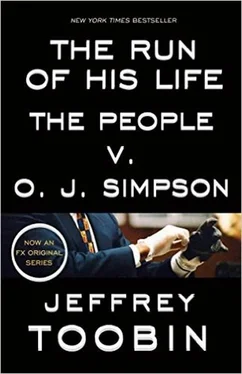Cochran and his allies, for their part, more than returned Shapiro’s disdain for them, and with perhaps even greater justification. On another day during the defense case, Shapiro’s fellow defense-team members caught him using a miniature Dictaphone in his pocket to record a meeting in the courthouse lockup among Simpson and his lawyers. As Shapiro later admitted, he was surreptitiously documenting these meetings so he could include them in the book he was planning to write about the case. Scheck and Neufeld, who believe strongly in the sanctity of the attorney-client privilege, were beside themselves with outrage at Shapiro over the tape-recording. On the rare occasions that Shapiro deigned to attend defense-team meetings, the atmosphere was poisonous.
To their credit, the prosecutors did not turn on each other in the waning days of the trial, but they didn’t entertain any great hopes of victory, either. By and large, they felt doomed by even the small number of excerpts that Ito had allowed from McKinny’s tapes. Still, the prosecution put together a smashing start to its brief rebuttal case-one the increasingly stupefied jury seemed barely to notice (and would scarcely comment upon after the trial). The rebuttal case began with the one positive bit of fallout from Darden’s glove fiasco. Amateur photographers around the country began searching their files for photographs of Simpson wearing leather gloves at football games. Several found examples, which they sent to the prosecution in Los Angeles. The first, taken on December 29, 1990, at a Chicago Bears game, was the most striking. The glove not only had identical features to the Aris model recovered in 1994, but this glove also looked tight on Simpson’s hand, just as the evidence gloves had. Richard Rubin, the glove expert, returned to the stand to say that he was “100 percent certain” that the gloves in the photographs were those rare Aris Lights, style 70263.
Neither side wanted to give the other the last word, so the case wound down, like a dying metronome, with each side calling a final few witnesses. The defense closed on a quasi-comic note, calling a pair of organized-crime informants, the brothers Larry and Tony “The Animal” Fiato. With their earrings and dyed hair, this duo looked like extras from a low-budget crime picture, but they actually served the defense cause very well.
The Fiato brothers had worked as informants in an unrelated criminal case investigated by Detective Tom Lange, Phil Vannatter’s partner. In January 1995, just as the Simpson trial was getting under way, the Fiatos were preparing for their testimony in one of these other cases when they started chatting with Vannatter. The topic turned to the Simpson case and the detectives’ controversial decision to leave the murder scene and go to O.J.’s home on Rockingham. They claimed that Vannatter said, apparently sarcastically, “We didn’t go up there with the intention of saving lives. He was the suspect.”
In a final day of testimony, September 19, the defense called four witnesses-Vannatter; Michael Wacks, an FBI agent who was present; and the two Fiato brothers-to testify about this conversation. All essentially agreed about what Vannatter had said, and all pretty much concluded that it seemed the detective had been joking. Yet the whole scene left a seedy impression of Vannatter in particular and the police as a whole. The defense succeeded, at the last moment, in raising a series of embarrassing questions. Was Vannatter’s long-questioned justification for going to Rockingham really true? What did he really tell the Fiato brothers? Why was the co-lead detective discussing the Simpson case at all with a pair of mafia informants? All these questions hung awkwardly in the air as the jury was about to get the case.
Yet the prosecutors couldn’t leave well (or badly) enough alone. Rather than simply ignore the Fiato sideshow, the prosecutors decided to call one final, final witness-the last of the trial, and one who served rather well as an emblem for the futility of the government’s efforts in this case.
On the morning of September 20, Marcia Clark called Keith D. Bushey, the ramrod-straight police officer who had served as the top LAPD administrator for the western quarter of the city in June 1994. Bushey testified that Detective Ron Phillips had called him at about 2:30 A.M. on June 13 to inform him that Nicole Brown Simpson’s body had been found. Bushey said that on hearing the news, he remembered that several members of John Belushi’s family had heard of his death through the news media. Bushey thought that was unfortunate so, he said, he ordered Phillips “to find O.J. Simpson just as soon as humanly possible and notify O.J. Simpson of his ex-wife’s death.” Clark thus wanted to use Bushey to convince the jury that Vannatter and the other detectives really had been telling the truth all along-that they went over to Rockingham to notify Simpson that his ex-wife had died.
The imperious Bushey never knew what hit him on cross-examination. Johnnie Cochran understood the LAPD better than any of the prosecutors. He knew how the police groveled before celebrities. The sinister brilliance of his examination of Bushey-and, indeed, of his defense in general-was that he made the preferential treatment accorded Simpson look like a different, more nefarious, kind of singling out. Cochran knew that Bushey would have to lie-that he couldn’t admit that celebrities won special favors from the LAPD. So Cochran spun those lies to his client’s advantage.
“Are you saying that the LAPD department in this case gave preferential treatment by sending four detectives to O.J. Simpson’s house in the early morning hours?” Cochran asked.
“No,” Bushey replied. “First of all, I don’t like the word ‘preferential treatment.’ ”
“Okay,” Cochran parried. “That was the word used by the prosecution.”
“Well, I don’t care…,” Bushey answered.
“You don’t like the word ‘preferential’ because on the side of the police car it says ‘protect and serve’ all the people?”
“That’s correct.”
“You’re supposed to treat all people alike, aren’t you?”
“We tried to,” Bushey answered glumly.
“And fair? You try?”
“Sure,” said Bushey.
Cochran found the heart of the issue a moment later when he asked, “In the course of your responsibilities that morning, were you more concerned about the department’s image than you were about investigating these very brutal murders?”
“Certainly not,” said Bushey, but the truth was very much the opposite.
The prosecution thus unaccountably completed its presentation in the O.J. Simpson murder case with a pious, double-talking fixture of the LAPD brass. And that might not have been even the worst of it. For in addition to everything else, Keith Bushey was a dead ringer for the most hated man in black Los Angeles-the former chief of the Los Angeles Police Department, Daryl Gates.

From the day he was hired in the case, Cochran teased the press with the possibility of Simpson testifying in his own defense. The lawyer said repeatedly that he wanted O.J. to testify and that O.J. himself wanted to testify, but these comments were just public relations. With the exception of Bailey, who actually did want Simpson to take the stand, no one on the defense team ever took the idea very seriously. Bailey thought, with good reason, that Simpson would have no chance of resuming anything like his former life unless he addressed the charges from the witness stand. Cochran and Shapiro were more worried about losing the case, and their view prevailed.
Still, even in jail, Simpson was as obsessed as ever by his image, and Cochran found an opportunity for him to put his point across. As part of the formalities of ending the case, Ito had to ask Simpson on September 22 whether he waived his right to testify. Cochran, in turn, requested that Simpson be allowed to make “a brief statement” as part of his waiver. Even though the jury was not present, Clark objected, saying that “this is a very obvious defense bid to get material admitted through those conjugal visits that is not admitted in court… Please don’t do this, Your Honor, I beg you.”
Читать дальше













